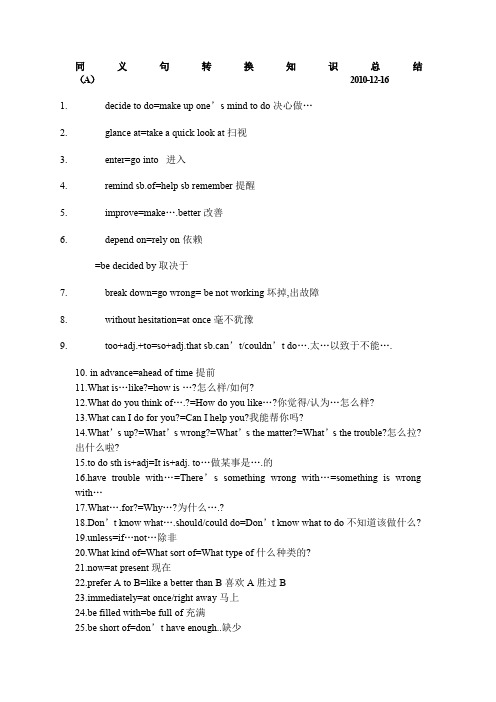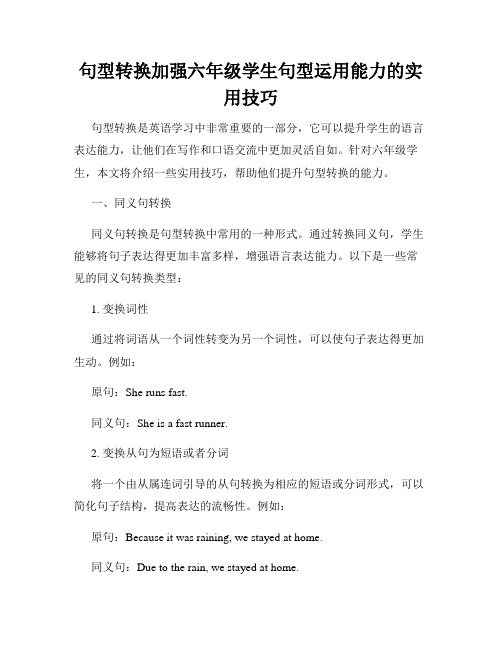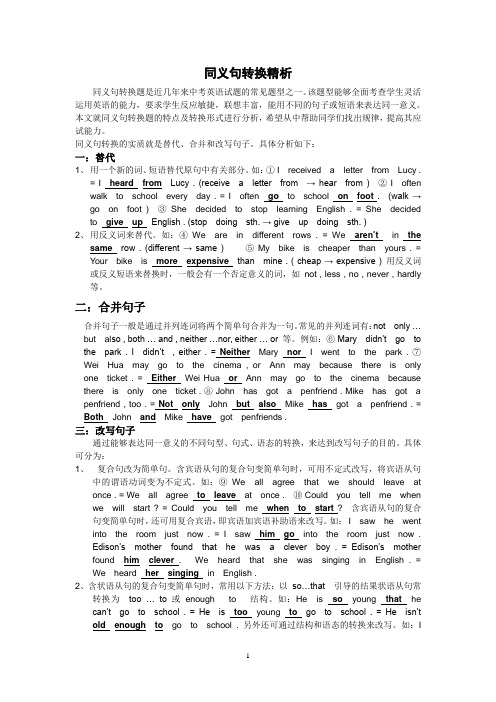“同义句”转化法小结
- 格式:doc
- 大小:23.50 KB
- 文档页数:3

同义句转换知识总结(A)2010-12-161.decide to do=make up one’s mind to do 决心做…2.glance at=take a quick look at扫视3.enter=go into 进入4.remind sb.of=help sb remember 提醒5.improve=make….better改善6.depend on=rely on依赖=be decided by 取决于7.break down=go wrong= be not working 坏掉,出故障8.without hesitation=at once 毫不犹豫9.too+adj.+to=so+adj.that sb.can’t/couldn’t do….太…以致于不能….10. in advance=ahead of time 提前11.What is…like?=how is …?怎么样/如何?12.What do you think of….?=How do you like…?你觉得/认为…怎么样?13.What can I do for you?=Can I help you?我能帮你吗?14.What’s up?=What’s wrong?=What’s the matter?=What’s the trouble?怎么拉?出什么啦?15.to do sth is+adj=It is+adj. to…做某事是….的16.have trouble with…=There’s something wrong with…=something is wrongwith…17.What….for?=Why…?为什么….?18.Don’t know what….should/could do=Don’t know what to do不知道该做什么?19.unless=if…not…除非20.What kind of=What sort of=What type of什么种类的?21.now=at present现在22.prefer A to B=like a better than B喜欢A胜过B23.immediately=at once/right away马上24.be filled with=be full of 充满25.be short of=don’t have enough..缺少26.apologize to sb=say sorry to sb道歉27.another+数字+n.=数字+more+n28.such a/an+adj+n=so+adj.+a/an+n29.by oneself=on one’s own=alone独自30.belong to=own /be one’s 属于31.be from=come from来自32.be good at=do well in擅长于33.be different from=be not the same as和…不同34.be interested in=be keen on对…感兴趣35.be responsible for=tae charge of/have the duty for/be in charge of负责,管理36.lie(in/at)=be located(in/at)位于,坐落于37be harmful to=be bad for对….有害38.take care of=look after// take good care of=look after…well很好地照顾39.reach=get to=arrive in/at到达40.over=more than超过改同义句:1.Tom decided to finish reading the book.2.The box is too heavy for her to carry.3.What did you reading this kind of book for?4.I like to learn the new words ahead of time.5.He came to remind his sister of the birthday party.6.How do you like this film?7.Tim didn’t know what he should do with the gift.8.What sort of music is your favourite?9.We will go hiking unless it rains tomorrow.10.I am having trouble with my computer.11.Susan depends on her ant because he parents died.12.My little sister wanted to improve her painting skill.13.To shout at old people is very impolite.14.What was the weather like last week.15.Mr. Lee glances at us and began his speech.16.The entered the building hurriedly.17.Can I help you?18.What’s up?19.She accepted my invitation without hesitation.20.Our television suddenly broke down.21.We all prefer basketball to volleyball.22.They will arrive in Shanghai next Sunday.23.The nurse looks after the patients well.24.Smoking is harmful to our health.25.Mr Smith takes charge of the company.26.There are over 20,000 books in the library.27.He is such a naughty boy.28.The villagers were short of food in winter.29.The box is full of apples.30.Mary is interested in watching films.31.The plane will take off right away.32.This car belongs to Jim.33.She is good at cooking.34.We need ten more people to finish the job.35.The city lies in the east of the country.36.The house price is very high now.37.The little boy often goes home alone.38.I apologized to my mother for being late.39.This song is different from that one.40.Jessie is from USA.。

句型转换加强六年级学生句型运用能力的实用技巧句型转换是英语学习中非常重要的一部分,它可以提升学生的语言表达能力,让他们在写作和口语交流中更加灵活自如。
针对六年级学生,本文将介绍一些实用技巧,帮助他们提升句型转换的能力。
一、同义句转换同义句转换是句型转换中常用的一种形式。
通过转换同义句,学生能够将句子表达得更加丰富多样,增强语言表达能力。
以下是一些常见的同义句转换类型:1. 变换词性通过将词语从一个词性转变为另一个词性,可以使句子表达得更加生动。
例如:原句:She runs fast.同义句:She is a fast runner.2. 变换从句为短语或者分词将一个由从属连词引导的从句转换为相应的短语或分词形式,可以简化句子结构,提高表达的流畅性。
例如:原句:Because it was raining, we stayed at home.同义句:Due to the rain, we stayed at home.3. 变换被动语态为主动语态将被动语态转换为主动语态,可以使句子更加直接明了,增强表达的力度。
例如:原句:The cake was eaten by Tom.同义句:Tom ate the cake.4. 变换否定句为肯定句将一个否定句转换为肯定句,可以使句子更加积极乐观,增强语言的感染力。
例如:原句:I didn't see him yesterday.同义句:I saw him yesterday.二、句型扩展句型扩展是指通过增加句子成分或者结构,使句子更加完整、详细、丰满,提高语言表达的准确性和逻辑性。
以下是一些常见的句型扩展类型:1. 增加主语/宾语通过增加主语或宾语,可以使句子变得更加详细具体。
例如:原句:He likes to read books.扩展句:Tom, a diligent student, likes to read books.2. 添加状语从句通过添加状语从句,可以扩展句子并丰富句子的内容。

英语句型转换同义句方法归纳Hey there! You know, when it comes to English learning, one of the most interesting and useful skills is being able to convert sentences into their equivalent forms. It's like having a magic trick up your sleeve!Let's start with the most basic type - changing verbs. For example, “like” and “be fond of”. If I say “I like reading books.”, I can also say “I am fond of reading books.” It's like swapping one key for another that still unlocks the same meaning door. How cool is that?Now, think about words that express the same idea but in different forms. Take “big” and “large”. If the sentence is “This is a big house.”, we can turn it into “This is a large house.” It's almost like changing the color of your shirt but still looking equally good.One really important method is using different sentence structures for the same meaning. Look at this. “I gave Tom a book.” We can also say “I gave a book to Tom.” It's kind of like taking two different paths to the same destination. You can gostraight through the park or around it, but you end up at the same place.Another nifty trick is with negative and positive expressions. For instance, “not many” and “few”. “There are not many people here.” is the same as “There are few people here.” Oh, it's just like flipping a coin - two sides but still part of the same coin.When it comes to adjectives and adverbs, there are also ways to make equivalent sentences. Say we have “He runs quickly.” We can also say “He is a quick runner.” It's as if you're rearranging the furniture in a room but it's still the same room.Let's talk about some more complex structures. Conditional sentences! “If you study hard, you will pass the exam.” can also be “Study hard and you will pass the exam.” It's like you have two different recipes that give you the same delicious cake.I remember when I was teaching my friend Jack about this. I said to him, “Jack, look at this sentence ‘She is too young to go to school.’” And he was like, “Huh? How can we change it?” I told him, “Well, we can say ‘She is so young that she can't go toschool.’” Jack was amazed. He said, “Oh, it's like a secret code that we can unlock different ways of saying things!” And I was like, “Exactly, Jack! It's like a mystery that we solve every time we do these conversi ons.”My classmate Lucy once had trouble with a sentence like “I find it difficult to learn math.” I showed her that it could be “I find learning math difficult.” She was so happy. She said, “Wow, it's like finding a shortcut in a maze!” And I thought, yea h, that's what it's all about.There are also ways to change passive voice to active voice and vice versa. For example, “The book was written by him.” can be “He wrote the book.” It's like seeing the same story from two different perspectives - one from the doer and one from the receiver.In conclusion, mastering the art of English sentence conversion into synonyms is not only fun but also super useful. It's like having a whole new set of tools in your English - learning toolbox. It makes your language skills more flexible and your expressions more diverse. So go ahead and practice these methods. You'll beamazed at how much your English improves!。

如何做好同义句转换题作者:陈裕明所谓同义句转换就是将一个句子用另一种形式表达出来,而且意思不变。
因此,掌握的句型越多,做题就越方便、快捷、容易。
但每种练习的方式总有一定的规律可循,这里我们就来进行归纳,试着从最常见的变化形式中找出一些规律来。
1. 用具有相同意思的词或词组进行转换。
如:(1) She had a good time in Wuhan.→She enjoyed herself in Wuhan.(2) He spends some money on books every week.→He pays some money to buy books every week. / Books cost him some money every week.2. 借助于反义词或反义词组进行转换。
如:(1) I can't run as fast as my brother.→I run more slowly than my brother. / My brother runs faster than I.(2) He is not old enough to go to school.→He is too young to go to school.3. 词语的理解和运用这里是指:由于词性不同,但所表达的意思相同的句型变换。
如:We often go to school on foot.→We often walk to school.小结:既然是同义句转换,首先要在意思不变的情况下进行正确的转换:1. 注意词类的变化使用,如名词、动词、形容词的相互转换;2. 短语的使用要注意正确的表达方式和同义短语的确定;3. 同义句型的使用及转换要在平时注意积累、归纳和运用。

中考英语同义词转换“十二类型”知识精讲同义句转换题近几年被全国各地中考英语试题广泛采用,为必考题型之一。
它属于句型转换题,但要求不能改变句子意思,即依据给出的句子,通过以词、词组、句式、语法的改变及换句来改写句子,且转换前后的句意应保持一致。
从某种意义上讲,同义句也就是一句多译。
日常学习过程中,必须加强一句多译的总结训练,注重转换的思路和方法,提高同义句转换的能力。
下面就总结归纳一下同义句转换的十二种类型:【类型一】运用同义词或同义词组替换原句的有关部分。
【解题要领】将原句中的某些词或词组,用其同义词或同义词组进行替换改变,这是同义句转换使用最多的类型。
在英语新教材中,同义词或词组的运用非常广泛,学习过程中要尽可能多地去归纳总结,以达到熟能生巧,举一反三的程度。
【经典例句】1、他擅长绘画。
He is good at drawing./He does well in drawing.2、今天风很大。
There is a strong wind today./It's very windy today.3、明天我们将乘飞机去东京。
Tomorrow we will go to Tokyo by air./Tomorrow we will fly to Tokyo.4、王先生在六点钟到达了火车站。
Mr Wang reached /got to /arrived at the railway station at six.5、这本书花了我10元钱。
I spent ten yuan on the book./I paid ten yuan for the book./The book cost me ten yuan.【直击中考】1.She got a letter from her penfriend last week.(2002某某省)She________ _________ her penfriend last week.2.Linda likes music better than art.(2002呼和浩特市)Linda________music ________ art.3.They enjoyed themselves at the garden party.(2002某某市)They________ ________ ________ ________at the garden party.4.The Smiths teach themselves Chinese after work.(2002聊城市)The Smiths ________ Chinese ________ themselves after work.【类型二】运用反义词或词组改写原句有关部分。

同义句转换精析同义句转换题是近几年来中考英语试题的常见题型之一。
该题型能够全面考查学生灵活运用英语的能力,要求学生反应敏捷,联想丰富,能用不同的句子或短语来表达同一意义。
本文就同义句转换题的特点及转换形式进行分析,希望从中帮助同学们找出规律,提高其应试能力。
同义句转换的实质就是替代、合并和改写句子。
具体分析如下:一:替代1、用一个新的词、短语替代原句中有关部分。
如:① I received a letter from Lucy .= I heard from Lucy . (receive a letter from → hear from ) ②I often walk to school every day . = I often go to school on foot. (walk → go on foot ) ③She decided to stop learning English . = She decided to give up English . (stop doing sth. → give up doing sth. )2、用反义词来替代。
如:④We are in different rows . = We aren’t in thesame row . (different → same ) ⑤My bike is cheaper than yours . = Your bike is more expensive than mine . ( cheap → expensive ) 用反义词或反义短语来替换时,一般会有一个否定意义的词,如not , less , no , never , hardly 等。
二:合并句子合并句子一般是通过并列连词将两个简单句合并为一句。
常见的并列连词有:not only … but al so , both … and , neither …nor, either … or 等。
初中英语同义句转换1、陈述句中肯定句变为否定句,大部分是用not来改变谓语结构,但也有借用否定意义的词,如nothing, nobody, none, neither, little, few, never, hardly等,例如::A:Tom does well in maths. B:Tom doesn’t do well in maths.A:He has much to do. B:He has nothing to do.A:All of my classmates like art. B:None of my classmates likes art.2、改为疑问句。
根据上下句的结构和词的减少,来判断变为哪一种形式的疑问句。
例如:A:My brother often has breakfast at school. B:Does your brother often have breakfast at school?A:Tom’s already weak in English. B:Tom’s already weak in English, isn’t he ?A:The red light changes every two minutes. B:How often does the red light change?3、改为感叹句。
根据所给的句子结构和单词的词性,来确定使用哪一种感叹句的形式,例如:A:This is an interesting book. B:What an interesting book this is! 或How interesting this book is!1、同义词或词组之间的转换。
(通常上下句时态保持一致)。
常见的同义词或词组有:1. “花费”spend-take-cost-take;2. “到达”get to-reach-arrive in/at;3. “收到…来信”hear from-geta letter from-receive a letter from-have a letter from4. “擅长于…”be good at -do well in5. “有空”be free-have time;6. “入睡”go to sleep-get to sleep-fall asleep;(7) “玩得开心”enjoy oneself-have a good time;(8)“给…打电话”call sb-telephone sb-ring sb. a call-make a telephone to sb.(9)“飞往…”fly to…-go to…by air/plane(10)“自学”teach oneself-learn…by oneself(11)在…方面帮助help…with…-help… (to)do…(12)在…差be weak in…-do badlyin…(13)能/会…c an-be able to更喜欢…like…better than…-prefer…to…(15)充满了…be full of…-be filled with…(16)放弃干…give up doing…-stop doing…(17)不再… no longer-not …any longer(18)照顾/保管take care of…-look after(19)展览on show-on display(20)阻止…干…stop…from doing-keep/prevent…from doing…(21)由于thanks to-becauseof…(22)举手hands up-put up one’s hands(23)最后,终于at last-in the end(24)与…不同bedifferent from…-be not thesame as…(25)从…借入… borrow…from…-lend…to…(26)乘公汽/火车/的go to…by bus/train/taxi-take a bus /train to(27)乘自行车去… go to…by bike-rid e a bike to…(28)为…感到自豪be proud of…-be the pride of…(29)步行去… walk to…-go to…on foot (30)独自地by oneself -alone等。
同义句转换类型同义句转换类型总结一、意思相同或相近的词或短语之间的转换。
1. The story happened in 1937. == The story _________ ________ in 1937.2. Li Lei received a letter from his aunt last week.===Li Lei his aunt last week.3. They will get to London in four days.===They will London in four days.二、意思相反的词或短语之间的转换。
1. I think your answer is wrong. === I your answer is .2. In some states of America, children must stay in school until they are sixteen.In some states of America, children school until they are sixteen.3. I lent him a dictionary yesterday.==== He a dictionary me yesterday.三、时态之间的转换。
1. His grandpa died four years ago.====His grandpa four years.2. Wei Hua joined the League three years ago. ====Wei Hua for three years.3. Where have you been?====Where you just now?四、语态之间的转换。
1. He was made to work 14 hours a day by them..==They 14 hours a day.2. You must clean your bedroom every day.=== Your bedroom every day.3. They heard her sing a song at the party.=== She a song atthe party.五、介词短语、动词(短语)之间的转换。
同义句转换是英语中考必考题型之一,其考察范围很广,解题方法也灵活多样,其中将复合句变为简单句就可成为同义句是最常用的方法。
我一直从事初中毕业班英语教学工作,贵报一直是我们的必订学习资料。
我们在使用时发现总结这方面的内容很少,现将自己在教学中所归纳的此类知识寄往本报,恳求得到编辑老师们的指导。
(山东省诸城市皇华镇郝戈庄初中杨桂莲)如何将复合句变为简单句一、利用动词不定式将复合句变为简单句。
初中阶段所学的有:1.I didn’t know which book I sh ould choose.I didn’t know which book to choose.运用“疑问词+不定式”结构。
2.He promised that he could help me with my math.He promised to help me with my math.3.It seemed that they had had breakfast.He seemed to have had breakfast.以上两题是将宾语从句变为动词不定式做宾语。
4.The bo y is so weak that he can’t carry the heavy box.The boy is too weak to carry the heavy box.5. The boy is so strong that he can carry the heavy box.The boy is strong enough to carry the heavy box.以上两题是将so…that…句型转化为too…to…句型与…enough to…句型。
6. He couldn’t help crying when he heard the bad news.He couldn’t help crying to hear the bad news.将时间状语从句转化为动词不定式做原因状语。
高考英语同义句转换句子转换是高考英语中的重要题型之一,要求考生根据句子给出的提示信息,变换句子结构,保持句意不变。
以下是一些常见的句子转换类型及其例子。
1. 否定句转换:句型:主语 + 动词 + 其他转换:主语 + 助动词(do/does/did)+ not + 动词 + 其他例句:He can speak English. -> He cannot speak English.2. 一般疑问句转换为否定句:句型:助动词(do/does/did)+ 主语 + 动词 + 其他?转换:助动词(do/does/did)+ 主语 + not + 动词 + 其他例句:Did you finish your homework? -> Did you not finish your homework?3. 否定疑问句转换为陈述句:句型:助动词(do/does/did)+ 主语 + not + 动词 + 其他?转换:主语 + 助动词(do/does/did)+ 动词 + 其他例句:Didn't he go to the party? -> He didn't go to the party.4. 原因状语从句转换为原因状语介词短语:句型:因果关系连词 + 主语 + 谓语 + 其他转换:介词 + 名词 + 主语 + 谓语 + 其他例句:As she was tired, she went to bed early. -> Because of tiredness, she went to bed early.5. 直接引语转换为间接引语:句型:直接引语转换:间接引语例句:She said, "I am going to the park." -> She said that she was going to the park.6. 感叹句转换为陈述句:句型:How + 形容词/副词 + 主语 + 谓语转换:主语 + 谓语例句:How beautiful the flowers are! -> The flowers are beautiful.以上是一些常见的高考英语同义句转换类型及其例子。
“同义句”转化法小结
汉语有句话叫:“话有三说,巧者为妙。
”其实英语中也有同样的情况,就是相同的意思可以用不同的句型表达,这便是我们经常提到的“同义句”转换。
那么“同义句”转换都有哪些类型呢?下面我们来做个小结。
1.不同词性转化法。
例如,
a. the doctor is operating on the boy.
the doctor is having an operation on the boy.
b. he has succeeded in business since he graduated.
he has had success in business since he graduated.
c. this is my bike.
this bike is mine.
2.反义词转换法。
例如,
a.don’t forget to turn off the lights when you leave.
remember to turn off the lights when you leave.
b. jenny is sitting on tom’s right.
tom is sitting on jenny’s left.
c.jim is shorter than tim.
tim is taller than jim.
3.同义词组转换法。
例如,
a. he has to look after his little sister at home.
he has to take care of his little sister at home.
b. they had a great time at the party last night.
they enjoyed themselves at the party last night.
c. they spent two years building the bridge.
it took them two years to build the bridge.
4.简单句与复合句互换法。
例如,
a. jim is too young to go to school.
jim is so young that he can’t go to school.
b. i don’t know what i should do next.
i don’t know what to do next.
c. he went to school when he was five years ol
d.
he went to school at the age of five.
5.祈使句转化法。
例如,
a. you mustn’t swim here. it is dangerous.
don’t swim here. it is dangerous.
b. if you study hard, you can pass the exam.
study hard, and you can pass the exam.
c. if you don’t get up now, you will be late for school. get up now, or you will be late for school.
6.动词短语与介词短语互换法。
例如,
a. his father flew to shanghai yesterday.
his father went to shanghai yesterday by plane.
b. mary walks to school every day.
mary goes to school on foot every day.
c.the man takes a bus to work..
the man goes to work by bus .
7.意思相同句型转化法。
例如,
a.what’s the weather like today?
how is the weather today?
b.what does your father do?
what’s your father?
c.how much is the pork?
what’s the price of the pork?
当然,在英语中,“同义句”转换的类型远不止上面提到的这几种。
在不同的情况下,我们要根据需要选择不同的转换方法。
但是无论用哪种方法,我们的目的就是要简洁、准确地表达出我们的想法,使别人能够很容易地明白我们的意思。
【责编田彩霞】。